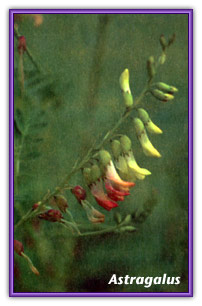 Source
Source
Astragalus is the root of A. membranaceus or A. membranaceus var. mongholicus (A. mongholicus), members of the pea family native to northeast China, where astragalus is commercially grown. Cultivation has also begun in the United States. In China, the root is called huang-qi.
Traditional Use
Astragalus is first mentioned in the 2,000-year-old classic, Shen Nong Ben Cao Jing. The Chinese name huang-qi means "yellow leader" because it is one of the superior tonic roots in traditional Chinese medicine. It has been used to invigorate vital energy (qi) and in prescriptions for shortness of breath, general weakness, and lack of appetite; also as a diuretic, and for the treatment of colds, flu, stomach ulcers, and diabetes. It is widely used in modern herbal practice in China.
Current Status
As one of the important tonic herbs in Chinese medicine, astragalus has been extensively studied by Asian scientists. Numerous studies confirm its immunostimulant, antibacterial, antiviral, anti- inflammatory, adaptogenic, and diuretic effects. It also improves stamina. No single compound is responsible for its wideranging, effects, though polysaccharides are involved in immunostimulant activity.
Since 1975, astragalus has been used in China in cancer patients undergoing radiation treatment and chemotherapy. Conventional cancer treatments reduce the function of the immune system, so astragalus helps return it to normal function. Its positive effects on the cardiovascular system have also been extensively studied in China.
In the early 1980s, researchers in Houston, Texas, studied the effects of astragalus on nineteen cancer patients and fifteen healthy individuals. A chemical fraction extract of astragalus was found to restore T-cell function in 90 percent of the cancer patients to levels observed in the healthy subjects. The studies showed that astragalus had a strong immunostimulant effect, thus establishing a basis for using it to improve response in cancer patients. Chinese studies show that immunostimulant effects include enhancing the particle ingestion capacity of white blood cells.
Preparations
The dried sliced root, which looks like a tongue depressor, is the usual form of the crude herb supplied from Chinese sources. Tinctures, tablets, capsules, powdered herb, extracts, and combination products are found in the American herb market. It is often combined with ginseng.
Cautions
No side effects or adverse reactions have been reported.
Symptoms
Colds
Flu
Infections, minor
Actions
Adaptogen (tonic)

![]()
![]()
![]()
 Source
Source